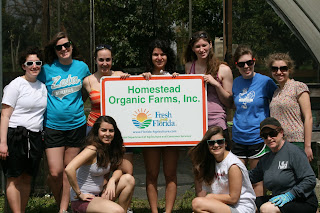Never thought so much about how staffing alternative breaks impact me. So often it is 20 people and one staff and so a big part of the break is spent with logistics, planning and jumping from one urgent need to another. This break with 10 female students, 3 of the students part of the leadership team and another staff person, my husband Jeff, who is good with logistics allows the freedom to reflect and delve into the meaning of social justice, Judaism, and my responsibility to myself and as an educator.
When I was young, I wanted to change the world. I tried, but the world did
not change. Then I tried to change my town, but the town did not change.
Then I tried to change my family, but my family did not change.
Then I knew: first I must change myself.
R. Israel Salanter from "To Heal a Fractured World"
How can I develop initiatives, conversations and opportunities for others if I am not passionate and impacted myself? I don’t believe one can. That is why I am listening deeply to informal conversations and feeling within my heart a core belief that there is hope for this world, our country, our state, our university, our Hillel, and our family to change the world for the better.
Working at the Women’s Shelter, a safe place, where we could send off positive feelings of hope. We shared stories, smiled, brought happiness to the women. We made a job that would take 2 days get done in a few hours. When we were done, the ladies smiled. We felt great. “Come back any time,” they said. We were able to give them a new agenda for the day, to bring them something. We showed them people cared; we cared and we wanted them to have freedom and dignity to go out in the world and take control.
I thought of Cupcake Brown and her autobiography that so affected me when I read it. It thought of others who had insufferable situations, but kept their optimism. Anne Frank did not survive her fate, but her optimism continues to ebb into our culture and create a way of thinking that no one else could have evoked. Can I contribute to that strong of an impact and change within our world?
If not me, would someone that had an opportunity to grow, reflect, develop as an individual because of my influence be the catalyst to positive change. I am already seeing it………….. It’s strange, but I am doing community service to help others; to give them a better life and make a difference, but I am reaping so much. I say to every one of the people who allow us to come into their places and work. Thank you so much. They seemed surprised that I am thanking them. They say thank you for all your work and for taking time to come here, but it is me who must thank them.
It is me who must thank the students.










